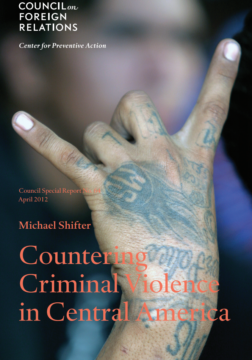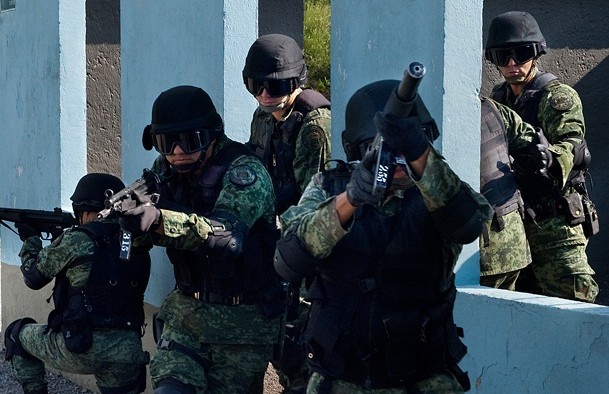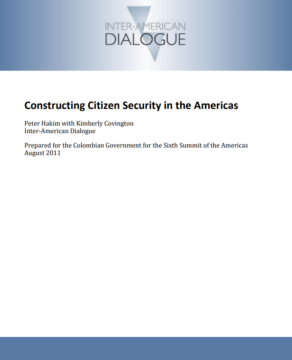
Countering Criminal Violence in Central America
Violent crime in Central America, particularly in the “northern triangle,” is reaching breathtaking levels.
On Wednesday, June 25th, the Dialogue and the Organization of American States hosted a discussion on U.S. drug policy in Latin America. The session featured Congressman Matt Salmon (R-AZ), Chairman of the House Foreign Affairs Subcommittee on the Western Hemisphere, Congressman Eliot Engel (D-NY), the Ranking Democrat on the House Foreign Affairs Committee, and Ambassador Paul E. Simons, Executive Secretary of the Inter-American Drug Abuse Commission at the OAS. The Dialogue’s Michael Shifter moderated the conversation.
Combating the drug trade has been at the top of the U.S. policy agenda in the Western Hemisphere for over a decade. Despite this focus and 6.7 billion dollars spent in intervention, violence and drug trafficking continue to threaten regional security. To address these persistent problems, Representatives Engel and Salmon have introduced the Western Hemisphere Drug Policy Commission Act, a law which would establish an independent directive to assess U.S. drug policy in Latin America and make recommendations for future efforts. Speaking to an audience on Capitol Hill, the two lawmakers laid out their plans for this commission.
Representative Salmon pointed to continued regional violence, a lack of maritime interdiction support, and high spending as primary motivations in seeking to re-evaluate drug policy. He hopes that the commission will help build better policies and reduce inefficient spending, goals that are in the moral and national interest of the United States. Using the current influx of unaccompanied minors crossing the border from Mexico as an example, Salmon argued that there will be repercussions in the United States if lawmakers turn a blind eye to violence in the Western Hemisphere.
Representative Engel noted that the United States has domestic obligations in the fight against drugs. With 24 million illicit drug users in 2012, the United States drives much of the drug trade in Latin America; without this high demand, supply would be reduced. To address this problem, Engel highlighted the need to reduce drug use. As a complementary strategy, Engel advised creating legislation to stop the flow of illegal firearms to Latin America. According to the Government Office of Accountability, 87 percent of the firearms seized by Mexican authorities from 2004 to 2008 originated in the United States. Admitting that there are no easy solutions, Engel advocates that the United States addresses domestic obligations to help reduce drug trafficking.
Paul Simons added that a unified international approach would be needed in the region, and that violence and the drug trade were primary concerns of Latin American leaders when they convened at the Cartagena Summit in 2012. Heads of state in the Western Hemisphere are carefully observing changes in the legal status of cannabis in the United States and Uruguay, but are wary of the potential effects of legalization and decriminalization. Simons suggested that public health approaches and seeking alternatives to incarceration for drug users should be an important part of any strategy combating the drug trade.
Participants concluded that the United States had a responsibility in helping to combat drug violence and that the Western Hemisphere Drug Policy Commission Act could play an important role in developing an effective strategy. Moreover, they agreed that reducing the level of drugs flowing into the United States and reducing violence in Central America and the Caribbean would require a multi-pronged strategy that strengthened regional economies. While many questions remain unanswered, panelists agreed that reevaluating current U.S. drug policy in the region was essential to reducing drug trafficking.
Violent crime in Central America, particularly in the “northern triangle,” is reaching breathtaking levels.
Members of Congress met with policy experts and government officials to discuss violence and crime in the region.
Public security is today the issue that most troubles the citizens of nearly every country of Latin America and the Caribbean.
 US Government
US Government
